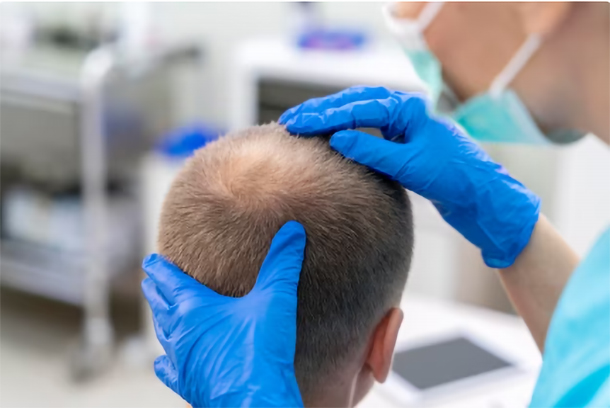Here are the top 10 do’s and don’ts for hair loss:
Do’s:
Maintain a Balanced Diet: Consume a diet rich in protein, vitamins (especially Biotin, Vitamin C, and Vitamin E), minerals (like Iron and Zinc), and healthy fats to support hair health.
Practice Stress Management: Find ways to manage and reduce stress through relaxation techniques, exercise, meditation, or seeking support from friends and family.
Use Gentle Hair Care: Be gentle with your hair, avoiding excessive pulling, harsh brushing, or tight hairstyles that can stress and damage the hair.
Keep Your Scalp Clean: Regularly cleanse your scalp and hair to prevent the buildup of excess oil, dirt, and product residue, which can clog hair follicles.
Seek Professional Advice: If you notice excessive hair loss or changes in your hair, consult with a dermatologist or healthcare provider to determine the underlying cause and appropriate treatment.
Use Nonsurgical Treatments: Consider nonsurgical treatments like minoxidil (over-the-counter) or finasteride (prescription) if recommended by a healthcare professional for androgenetic alopecia (male pattern baldness).
Stay Hydrated: Drink plenty of water to keep your body and scalp hydrated, which supports overall hair health.
Protect Your Hair from the Sun: Excessive sun exposure can damage hair proteins and cause dryness. Wear a hat or use hair products with UV protection when exposed to the sun for prolonged periods
Massage Your Scalp: Regular scalp massages can help improve blood circulation to the hair follicles and promote hair growth.
Use Silk or Satin Pillowcases: Sleeping on silk or satin pillowcases can reduce friction and minimize hair breakage compared to cotton pillowcases.
Don’ts:
Don’t Overstyle or Overprocess: Avoid excessive heat styling, chemical treatments (like bleaching and perming), and tight hairstyles that can damage the hair shaft.
Don’t Pull or Tug: Refrain from pulling or tugging at your hair, as it can lead to hair breakage and even hair loss in some cases.
Don’t Smoke: Smoking can contribute to hair loss by reducing blood flow to the hair follicles and causing oxidative stress.
Avoid Crash Diets: Extreme weight loss or restrictive diets can lead to nutrient deficiencies, which may contribute to hair loss.
Don’t Ignore Underlying Health Issues: Address any underlying medical conditions that could be causing hair loss, such as thyroid problems or hormonal imbalances.
Avoid Self-Medicating: Don’t use hair loss treatments without proper guidance from a healthcare professional.
Don’t Stress About Hair Loss: Stressing about hair loss can worsen the condition. Instead, focus on managing stress and seeking appropriate treatment.
Don’t Neglect Scalp Health: A healthy scalp is crucial for healthy hair growth. Keep your scalp clean and address any scalp conditions promptly.
Avoid Excessive Chemical Exposure: Limit exposure to environmental pollutants and harmful chemicals that can damage hair.
Don’t Delay Treatment: If you notice significant hair loss or changes in your hair, don’t wait too long to seek professional advice. Early intervention can improve outcomes.
Remember, individual responses to hair loss treatments may vary, and it’s essential to work with a healthcare professional to determine the most suitable approach for your specific situation.




1 Comment
Philip James
Sed vestibulum, molestie ultrices in imperdiet tristique tortor condimentum. Tempor mauris dolor, ipsum in congue, class lacinia in etiam elementum elit ultrices, habitant tincidunt vitae tellus lectus a vitae, justo felis tellus platea. Ut justo laoreet dolor, velit libero, vestibulum sem, mollis suspendisse maecenas dolor.